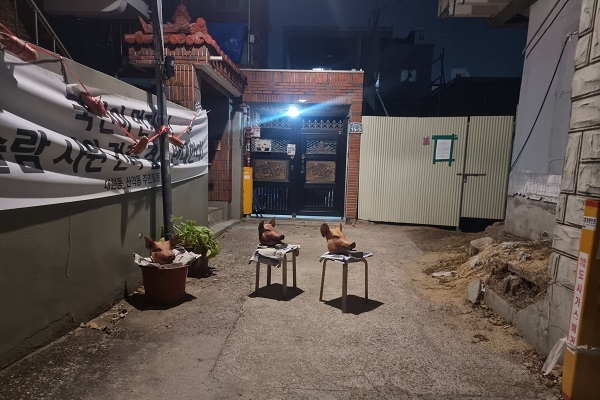Under Construction Mosque in S Korea Targeted by Islamophobic Attack

This Thursday, December 15, the "Daegu Anti-Mosque Committee" organized a big barbecue with pork, only a few meters away from the mosque under construction. It is in this area of Daegu, a large city in southern Korea, that dozens of Muslim students from nearby Kyungpook University gather.
A few days earlier, on 6 December, a pig's head was placed on a chair in front of the mosque. It was the third time in two months that foreign Muslim students had found this macabre installation, a dubious reference to Islam's ban on eating pork.
In Daegu, Muslim students had been meeting since 2014 in a two-storey house that served as a cultural and religious centre. At the end of 2020, they had obtained the administrative green light to transform this centre into a real mosque.
But since then, they have faced opposition from a group of neighbours who regularly demonstrate to block the work. These demonstrations have taken an Islamophobic turn on several occasions, as several videos and photos sent to our editorial office by one of the students show.
"They play music very loudly during our prayer time"
Muaz Razaq left Pakistan in 2019 for Kyungpook University in Daegu, which he says is attended by about 100 Muslim students. He says relations with the neighbours were quite good before the construction of the mosque began in 2021.
In the beginning, some of us were called terrorists when we met the demonstrators. They covered the site with anti-Islamic signs and distributed flyers with Islamophobic messages in the streets. It calmed down a bit after the South Korean Human Rights Commission ruled that this form of protest was discriminatory [in October 2021].
But in the last few months, the opponents of the mosque project have started to play loud music several times during our prayer time, or put these pig heads in front of the mosque.
For about two months now, three pigs' heads have been placed in front of the gate, the first head having been installed on 27 October. The first head was installed on 27 October. Muslim students who go to the mosque to pray pass by the gate every day.
The students who came across the pigs' heads were shocked. It's not just because it's a pig's head, it could have been any animal, apart from the religious dimension, it's quite violent to be confronted with that, to put that in front of someone's house.
The opponents argued in the Korean press that it was a tradition, but why are they doing it in front of the mosque? And if it's such a widespread tradition, how come I've never seen this in the three years I've lived in South Korea?

A shamanic ritual involving a pig's head does exist in Korea, but to inaugurate new businesses. Several residents interviewed by the Korean press rejected any accusation of Islamophobia, arguing that they simply do not want to see a religious building in the heart of their neighbourhood, as it would threaten their privacy because of the traffic and noise generated. One neighbour told Korea Time that she would have opposed the project if it were a church. But for Muaz Razaq, it is a religious issue:
Even if they say it is not Islamophobia, their actions speak for themselves. Why then don't they say anything about the huge church next door? They also complain a lot about the smell and the noise, [especially during Muslim religious holidays, editor's note]. But having a finished, modern mosque, unlike what we have today, would change all that.
"Before this mosque, we had a good relationship with the neighbours"
After several legal proceedings initiated by the inhabitants to stop the construction, the case went all the way to the South Korean Supreme Court, which ruled in favour of the construction of the mosque in September 2022. But the conflict is far from over and Muaz Razaq has little hope of a return to dialogue.
We really tried everything, but as soon as it became more violent, especially towards our religion, the dialogue was broken. It's hard to talk to them because they just want us to leave. At the moment, the district office is trying to find an alternative equivalent place.
In South Korea, the case is fuelling the debate on "multiculturalism" in a still conservative society. The centrally located city of Daegu is also less exposed to other cultures than the capital Seoul. Despite this complicated situation in Daegu, Muaz Razaq says he has not experienced any other difficulties as a Muslim in South Korea.
Before there was a mosque, we even had a good relationship with the neighbours, and I didn't suffer any discrimination because of my religion. I don't want to generalise and I have met many very tolerant people in this country too. I think that some political and religious parties just encourage a sense of fear among our neighbours.
In 2022, 200,000 Muslims were living in South Korea, the majority of them foreign nationals, representing less than one percent of the population, compared to about 30% Christians and 17% Buddhists in 2021. The country has about ten mosques and cultural centres to accommodate the faithful, including the great mosque of Seoul, built in 1976.
Source: observers.france24.com



